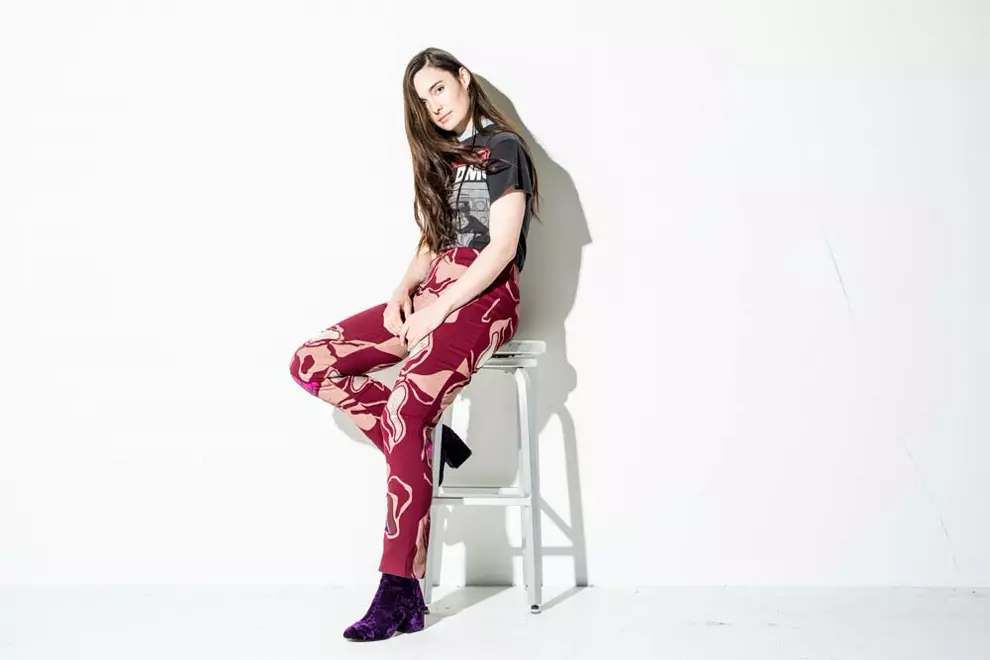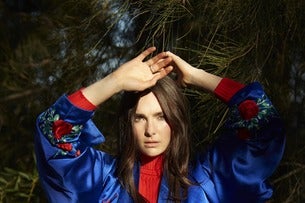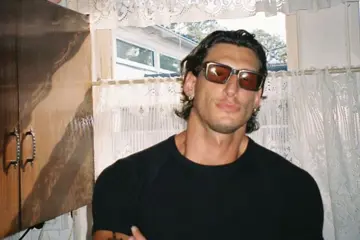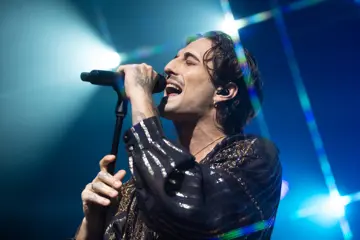 Lisa Mitchell
Lisa Mitchell"My younger self, she was interesting," says Lisa Mitchell, "I'm interested in her." The folkie singer-songwriter is now 26, and her newly released third record, Warriors, shows the signs of getting older. There's songs about life and death and love and dancing, but the main sense is one of time passing. Its title track was inspired by a specific high school memory, still flickering bright.
"I really vividly remember being on the bus home from school, in Albury, and hearing Straight Lines by Silverchair for the first time, and not knowing who it was, but just yelling at the bus driver to turn it up," laughs Mitchell. "For a long time, I looked towards external sources of inspiration, but now I feel like I can look back and say: 'What about me? What about my own life?'"
The song, Warriors, was an attempt to tap into that old feeling, with much of the resulting record using the optimism and audaciousness of youth to beat back the unsure feelings of adulthood. "A lot of the songs, and the attitude, are me trying to remember what I was like when I was 15," Mitchell offers. "It's such a powerful age. It's this formative, transformative age. You're not an adult, you're not old enough to drive or drink yet, but you're starting to form your own opinions, your own identity. At the same time, you're so innocent and naive. There's a massive amount of wonder you still have for the world. Your hopes and dreams haven't been fully crushed yet! My dreams, when I was that age, were just massive. I was expecting so much. I'm interested in what my life was actually like at that time - just hanging out with friends, laughter, jokes, really normal stuff - [in contrast with] these wild ambitions, and this crazy imagination that you have."
"A lot of the songs, and the attitude, are me trying to remember what I was like when I was 15."
Having started writing songs as a teenager, Mitchell wanted to - in working on a follow-up to her 2012 LP, Bless This Mess - remember those feelings, stay true to those young dreams. "It's like checking in: 'Hey, 15-year-old Lisa, Is this good? Is this cool? Is this what we wanted to do?' I still find a lot of inspiration from the role models I gravitated towards when I was 15, 16. Sarah Blasko was on my pinboard, Clare Bowditch. I think it's so cool that my 15-year-old self wasn't just fixated on that American pop world that we're so saturated with when we're kids. In the past couple of years, I've been so fascinated and appreciative of my childhood. I'm 26, now. I was 16 when I first came out from the umbrella of my family. That was the end of my childhood, in a lot of ways."
Don't miss a beat with our FREE daily newsletter
The end of Mitchell's childhood came, for her, when she ended up on Australian Idol in 2006. At the time, she still felt under the "umbrella of [her] family" - "because I was 16, I was a minor. My mum was up in Sydney with me all the time for the Idol stuff" - and, in some ways, isolated from her newfound televisual celebrity. "Which is strange, now that I think of it, because when you're young, you care so much about what other people think of you, and just being a performer, you're making yourself so vulnerable. But, I never really thought of how all the people who were seeing me were perceiving me."
"I remember once bailing in a rehearsal, I just had to get out of there. I heard, later, that they spent half an hour trying to find the microphone, because I just dropped it and just bailed."
But, Mitchell's Australian Idol experience also gave her a window into a side of the entertainment world that she realised she didn't want to be a part of. "I remember being freaked out, not about performing, but just about other things," Mitchell recounts. "Like, doing medleys of these old '80s pop-songs, it was like my worst nightmare. I remember once bailing in a rehearsal, I just had to get out of there. I heard, later, that they spent half an hour trying to find the microphone, because I just dropped it and just bailed. Ugh. I think it just showed me that there are lots of different ways of being in the creative world, and that you have to choose the way you want to be involved, and stick to it, or else you can end up somewhere where you don't want to be."
Through the making of her first two EPs - 2007's Said One To The Other and 2008's Welcome To The Afternoon - Mitchell found herself having to fight to preserve her own ideas about who she wanted to be, how she wanted her music to sound. For her debut LP, 2009's Wonder, she had a clear vision: wanting to present the songs with honesty, in both lyric and production. "Being young, you're really stubborn," Mitchell laughs. "When I made [Wonder], I was so headstrong about what I was doing. If anyone suggested something, I was just like 'nuh!' I was adamant about doing it my way. As you get older, you just relax a little bit more, get not so attached to things."
"But," she continues, "creatively, it's always going to be a fight, as soon as there's anyone else involved. For a long time I really resented that if you have a creative idea you do have to really put effort into selling the people around you on it. The crux of what creativity is is that it's the edge of where people feel comfortable, like you're constantly moving away from where your comfort zone is. I'm constantly trying to get things over the line. I think that's the reality of being an artist. So, I think it's normal for you to make other people around you uncomfortable. You have to fight for your vision, no matter how silly or aloof or whimsical it seems."
For Mitchell, making Warriors meant finding common ground with producer Eric Dubowsky, who's previously worked with Chet Faker, Flume and Kimbra. "We had to work out where we intersected," Mitchell says. "We realised we both really liked '90s pop, even something like Kiss Me by Sixpence None The Richer: something just super-simple, super-beautiful, really human, really romantic and really pop."
Mitchell calls the songs "little jewels of me, as a human," yet isn't sure how they reflect upon her. "To me, I'm just me, even on stage and in songs. But, everyone is going to have a different conception of who you are; they're going to project on you their own personal stuff, think they know you because you're recording under your own name," Mitchell offers. "For me, I'm more inspired by what I'm making if I detach myself from it. Sometimes I'll think about the person making the album as 'her'. What is she making? What is she doing? It's a way of getting out of it, of detaching it from your ego and your whole life. Otherwise, it can be overwhelming: wondering what your mum's going to think, what your dad's going to think, what your sister's going to think, what your ex-boyfriend's going to think. All the shit that I think about, I don't want her to have to be burdened with that, I want her to feel free. But, at the same time, I don't want people to think, for a second, that this isn't just me."

















